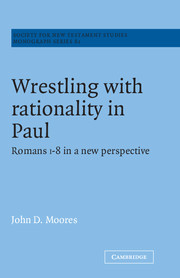Book contents
- Frontmatter
- Contents
- Acknowledgements
- List of abbreviations
- Introduction: The layout of this study and the approach behind it
- 1 Enthymematic semiosis in Paul
- 2 Varieties of enthymematic effect in Romans 1–4
- 3 Ways in which enthymemes arise in Romans 5–7
- 4 How enthymematic argument stands in Romans 8
- 5 Knowing what tune Paul is playing
- Conclusions reached their scope assessed
- Notes
- Bibliography
- Index of names
- Index of technical terms
4 - How enthymematic argument stands in Romans 8
Published online by Cambridge University Press: 08 October 2009
- Frontmatter
- Contents
- Acknowledgements
- List of abbreviations
- Introduction: The layout of this study and the approach behind it
- 1 Enthymematic semiosis in Paul
- 2 Varieties of enthymematic effect in Romans 1–4
- 3 Ways in which enthymemes arise in Romans 5–7
- 4 How enthymematic argument stands in Romans 8
- 5 Knowing what tune Paul is playing
- Conclusions reached their scope assessed
- Notes
- Bibliography
- Index of names
- Index of technical terms
Summary
The Christian's reprieve and the two ‘laws’. The case for seeing 8:1 as an inference enthymematically drawn from 8:2. Different ways of unpacking ăpa, and their bearing on the issue.
Romans 8 opens with a statement which is at once supported by a reason signposted as such by the usual ydp. The resulting two-member unit is itself signposted as consequent on what has gone before by the less usual ăpa (very unusual in being paired here not with o5v but with vũv). These facts in themselves are insufficient to warrant the expectation that the dependence in either direction is of a kind that involves the principle of deductive logic. If I say ‘the pavements are not dry yet for it has only just stopped raining’ I am probably just naming the cause of the situation. If I say ‘the pavements cannot be dry yet as it has only just stopped raining’, I am applying the principle of deductive logic. Paul here may be doing either of these things. And, given the nature of his theme, it is not easy to be sure which is involved.
In the case of the dependence signalled by yáp, assessment will obviously begin from a consideration of the two members which the particle serves to link as they stand before us in the text. In the case of the dependence signalled by ăpa, the question that at once arises is: what area of text is relevant? I believe the two cases here to be closely inter-related, but let us start from the former where the area of text to be focussed on is not in any doubt.
- Type
- Chapter
- Information
- Wrestling with Rationality in PaulRomans 1-8 in a New Perspective, pp. 102 - 131Publisher: Cambridge University PressPrint publication year: 1995



